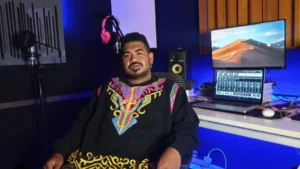
Introduction
In the heart of Indonesia’s easternmost region, where thick jungles meet the Pacific and culture beats louder than politics, a voice rises—rhythmic, raw, and resolute. His name is Epo d’Fenomeno, and he is more than just a rapper. He is a movement. A storyteller. A living testimony of how art and identity can become instruments of resistance and hope.
This is the inspirational story of a young man from Papua who dared to dream beyond boundaries, using hip-hop as a megaphone to shout truth, justice, and self-love into a world that too often overlooks his homeland.
Early Life in the Land of Contrast
Epo d’Fenomeno, whose real name is Efraim Yoku, was born in Sentani, Papua, where modern cityscapes are still flanked by ancient mountains and sacred lakes. Growing up in this paradox of beauty and struggle, Epo saw both the richness of Papuan culture and the harsh realities of marginalization.
From a young age, he was drawn to music—not the slow folk ballads of tradition, but the sharp, pounding beats of rap and hip-hop. It wasn’t just the rhythm; it was the rebellion, the message, the poetry of pain and protest that caught his heart.
In a community where dreams are often deferred by economic hardship and political turbulence, Epo dared to write lyrics, make beats, and envision a bigger stage.
Discovering the Power of Words
Epo’s first encounters with rap came through bootleg mixtapes and downloaded tracks from artists like 2Pac, Nas, and Indonesian underground rappers. But soon, his lyrics diverged from imitation into introspection. Instead of rapping about urban glamour, he began rapping about life in Papua—the discrimination, the police violence, the loss of land, the strength of women, and the dignity of black Papuan identity.
“I rap because I am angry, but also because I believe my words can heal,” Epo once said in an interview.
In high school, he formed a local rap group with friends. They performed at youth events, protests, and open mic sessions. Though he lacked studio equipment, Epo recorded songs in makeshift home studios with borrowed mics and open-source software. Passion replaced perfection.
Going Against the Current
In Indonesia’s mainstream media, Papuan voices are rare—especially those that speak boldly and politically. Epo chose not to remain silent.
His early tracks such as “Tanahku Berdarah” and “Hitam Tak Harus Takut” became underground hits, circulating through YouTube and WhatsApp groups among Papuan youth. His songs tackled:
- Police brutality
- Land grabbing by corporations
- Racism in Indonesian schools
- Pride in black Papuan identity
- Faith, family, and forgiveness
The lyrics, often in a mix of Bahasa Indonesia, Tok Pisin dialect, and English, struck a chord. Epo wasn’t just rapping to entertain; he was rapping to educate and awaken.
Education, Activism, and Art
Epo d’Fenomeno did not limit his growth to music alone. He pursued higher education in Yogyakarta—one of Indonesia’s cultural hubs. There, he experienced a broader artistic ecosystem but also encountered racial prejudice.
Instead of backing down, he doubled down.
He began hosting spoken word nights, collaborating with student activists, and organizing cultural festivals. He joined campaigns to defend Papuan students’ rights and often performed at protests, turning his rap lyrics into anthems of resistance.
At one point, he was briefly detained for his participation in a peaceful protest. But this only sharpened his resolve.
Building a Platform for Others
As Epo’s name grew in underground circles, he realized that his journey wasn’t just about himself. It was about uplifting a generation.
He co-founded a collective called Ritme Rimba (Rhythm of the Jungle), a group of Papuan rappers, beatmakers, and dancers who tour across schools, cultural centers, and villages. Their mission: to empower Papuan youth through art.
The collective provides:
- Rap writing workshops
- Safe spaces for youth expression
- Community events that blend hip-hop with traditional dance and chants
- Mental health talks through music
Their motto? “Suara Hitam, Hati Merah Putih” — Black Voice, Red-and-White Heart.
Digital Breakthrough and Wider Reach
While mainstream radio stations still hesitate to play his politically charged tracks, social media became Epo’s amplifier.
His Instagram and YouTube channels are filled with:
- Music videos filmed in Papuan villages
- Interviews with local elders and youth
- Freestyle sessions from bamboo huts
- Collaborations with Indonesian indie artists
In 2022, his track “Beta Papua, Bukan Sampah” (“I Am Papua, Not Trash”) went viral, garnering hundreds of thousands of views and sparking national conversation.
Soon after, he was invited to perform at Ubud Writers & Readers Festival, Freedom Festival Jakarta, and even international virtual panels on indigenous resistance and youth artivism.
Facing Criticism and Staying Grounded
With fame also came critics—some accused him of being too political, others too radical. Some industry gatekeepers advised him to tone down his message for better commercial success.
Epo responded the only way he knew how—with a song.
In “Jangan Suruh Beta Diam” (“Don’t Tell Me to Be Quiet”), he addressed:
- The pressure to conform
- The temptation of selling out
- The sacred duty of representing his people
He continues to balance honesty with hope, never letting criticism silence the voice he’s fought so hard to build.
Lessons from Epo’s Journey for Today’s Generation
Epo d’Fenomeno’s story is not just inspiring—it is instructional. He teaches youth everywhere, especially in Papua, that:
| Value | What Epo Teaches |
|---|---|
| Identity | Be proud of your roots, your skin, your language |
| Persistence | Even when the system ignores you, don’t stop |
| Creativity | Turn pain into art and protest into poetry |
| Leadership | Use your success to open doors for others |
| Vision | Don’t just chase fame—build a future |
Epo reminds us that you don’t need a perfect background to pursue greatness. You need conviction, community, and creativity.
Future Dreams: What’s Next for Epo?
Despite his success, Epo remains grounded. He dreams of:
- Building a recording studio in Jayapura for free use by Papuan youth
- Releasing a full-length multilingual album that fuses hip-hop with traditional music
- Launching a youth center that combines arts, education, and mental health awareness
- Creating a documentary about Papua seen through the lens of its youth
- Performing on international stages while keeping his lyrics rooted in local truth
Conclusion: From the Margins to the Mic
Epo d’Fenomeno is living proof that a young boy from the edge of the map can rewrite his story—and the story of his people—through rhythm, resistance, and relentless love for his homeland.
In a world where algorithms reward spectacle, Epo chooses substance. Where the industry wants passivity, he offers purpose. And where society tries to silence, he sings louder.










This article brilliantly highlights how AI is reshaping creative workflows. Tools like are pushing boundaries, especially with tri-modal interaction and Figma integration, making design smarter and faster.